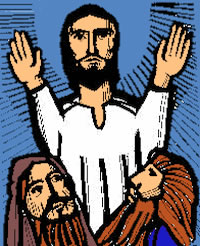
Feast of the Transfiguration - August 6th
Mark’s gospel confronts us with the theme, WHO IS THIS MAN? It is a question to which we are invited to find the answer, by taking more seriously how the life and death of the Saviour is an expression of the ways of God. In all probability, Mark’s original audience were the Roman Church of the beginning which was experiencing the ordeal of Nero’s persecution. If their answer to this question was lacking in depth and seriousness, they were invited to meet again the One who, in Mark’s account, immediately before his Transfiguration called his true followers to ‘take up their cross and follow him’ – ‘anyone who loses his life for my sake and for the sake of the gospel, will save it’. That Mark’s gospel is written for a community that has heard Peter tell the story of Jesus is given strong support by the fact that – in contrast to the other synoptic gospels – Mark’s account does not omit any of the embarrassing details of the part played by Peter in the gospel story. The words of Jesus, that we have just quoted from Mark in the passage leading up to the Transfiguration, follow a remarkable sequence in which Peter replies to the question, ‘Who do you say I am?’ with his confession of faith, ‘You are the Christ’ – you are the one who will fulfil all the hopes of Israel. Jesus then ‘began to teach them’ what his undertaking of this role would involve. He identifies himself with the victorious ‘Son of Man’ spoken of in our first reading from the Book of Daniel; but his victory, ‘he tells them quite openly’ will be achieved through his suffering and death. When the impetuous Peter refused to accept this he was severely rebuked, and told he does not understand God’s ways.
Mark’s Transfiguration narrative leads to the comment that Peter’s strange suggestion, that three tents be erected, is made because ‘he did not know what to say; they were too frightened’. The narrative then comes to a climax with the words of the heavenly Father, ‘This is my Son, the Beloved. Listen to him’. The confusion and fear of Peter and the other disciples shows they are on their way to the fullness of faith, as they come to terms with Jesus’ teaching concerning the ways of God that are to find expression in his coming death and resurrection triumph. Retold in every generation of Christian faith, this story invites us all to ask ourselves whether we have found the faith to come to terms with the challenging ways of God as we face the struggles of life.
The story of the Transfiguration is puzzling in many ways. We find it hard to square with the disillusionment which was soon to overtake the apostolic group. It has been suggested that it had its origin in a witnessing by the chosen apostles of a moment of ecstatic prayer of Jesus as he communed with his Father. Luke’s account states that Jesus went up the mountain to pray; and he describes the apostles as having their experience as they awoke from a ‘heavy sleep’. We can imagine their privileged sharing in the prayer of Jesus leaving them confused. After his resurrection triumph, however, the story was told in dramatic terms that clearly echo the experience of Moses on Mount Sinai.
John Thornhill sm

